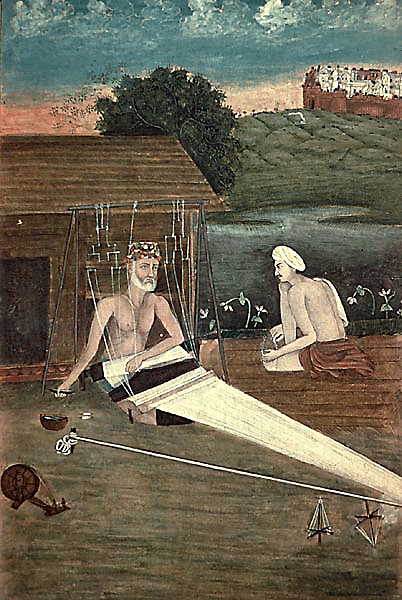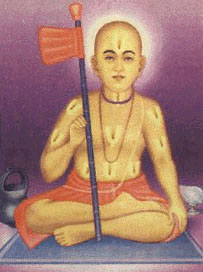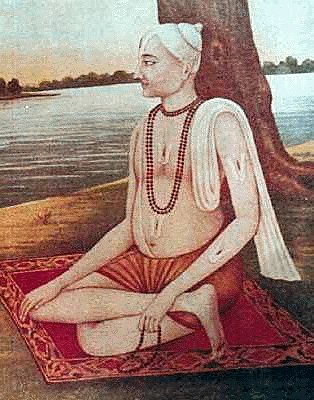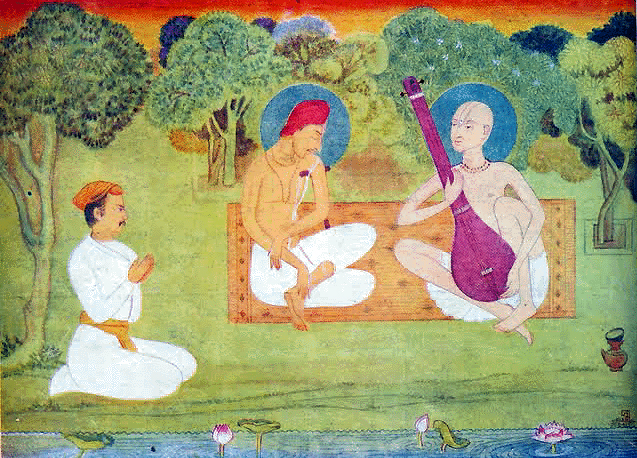
|
|
|
|
BY: SUN STAFF

Kabir, Weaving Dec 12, CANADA (SUN) — 'Vaisnavite Movements' from IGNOU curriculum, Part 4. Ramananda (1299-1410) In northern India, it was Ramananda who initiated the Vaishnava movement. Although Vaishnavism in this region started before him, the credit goes to him for popularizing Vaishnavism. Ramananda and his guru Raghavananda were influenced by Ramanuja's philosophy of bhakti and it is also said that they were influenced by the Natha-pantha, non-Vaishnava movement in northern India. According to the prevailing tradition, Raghavananda initiated Ramananda to the Visistadvaita faith, which advocates that the Supreme Being, though practically non-dual, may assume any form He likes. Ramananda introduced the worship of Rama and Sita in place of Krishna and Radha and used vernacular in place of Sanskrit for propagation of
bhakti ideology. He shocked the orthodox section of the society by including among his disciples an outcaste, a Muslim, a barber and a cobbler. He proved that birth does not come on the way to bhakti. His hymns are very popular, one of them being incorporated in the Granth Sahib of the Sikhs.

Ramananda Kabir Kabir was one of the great disciples of Ramananda. It is said that being discarded by his mother, Kabir was brought up in a Muslim weaver family. His lucid lyrics of devotion, for the first time composed in the local language of Hindi, touched the heart of the masses. More than scripture or doctrine, Kabir based his religion on mysticism itself. Moving away from philosophical debates over dualistic or non-dualistic nature of Ultimate Reality, he emphasized personal spiritual experience as the way of realizing the truth. This spiritual experience can not be explained in words. To Kabir bhakti is not merely surrender, but continuous effort of self-realization through knowledge and courage. By knowledge, Kabir did not mean scholastic learning. He spoke of knowledge in terms of knowing the spiritual truth through one's own experience. He stressed reasoning and one's ability to free himself from doubts. He expressed his realization of Ultimate Truth in the following words: "Having called out to you as you for so long, I myself have now turned into you and have lost all sense of my selfhood. Now that the consciousness of "you" and "I" is no more in me, I find only you, no matter where I look." He was against ritualistic forms of religious devotion. It is believed that Kabir definitely came under the influence of not only Vaishnava gurus, but also of the Natha-pantha and Sufism. In terms of ideas as well as terminology and idioms, resemblances are found between Kabir's verses and the Natha-panthi literature. Kabir advocated strongly for universalism and urged not to make distinctions between Rama and Rahim, between a brahmin and a sudra, and between a Hindu and a Muslim, because God is viewed as one and all pervading. Kabir was against outward symbols of religious life and seriously questioned the root of various superstitions. Kabir said:

Tulsidas Tulsidas Tulsidas was another great exponent of bhakti ideology in northern India. His religious ideas were based on the Bhagavata. His own spiritual experience, rather than any particular metaphysical or ontological system, influenced in formulating his concept of bhakti. According to Tulsidas, bhakti is an independent path but jnana and karma facilitate the way to attain bhakti. God in the form of Rama is the ruler of all and man's ultimate goal is to surrender before Him. It is through his great literary work Ramacharitamanasa that he gave expression to his religious ideas. It was written in Avadhi, the dialect of Hindi spoken in Ayodhya region. At the core of this work is bhakti. Tulsidas not only talked about different forms of bhakti but also various levels of spirituality leading to bhakti. His bhakti is not dependent on knowledge, but emanates from the heart when it becomes free from all attachments. According to Tulsidas, to Rama only the bonds of devotion matters. So your caste or creed has no value, you devote yourself to God and you belong to Him.

Tansen, Surdas, and Haridas Surdas Surdas, through his poetry, gave expression to various forms of love. It is said that Vallabha initiated Surdas in the philosophy of bhakti. Among his various literary works expressing diverse forms of love, Surasagara, Surasaravali and Sahitya Lahari are most important. His verses were mainly to sing the Lilas of Krishna and Radha. According to Surdas, all the objects of the world are parts of Brahman. God is all pervasive, and only through bhakti one can realize the Brahman.
| |